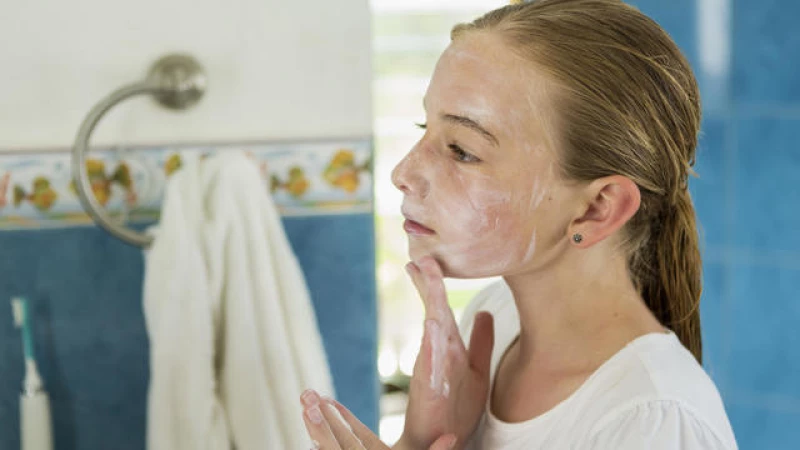The trend of teens and tweens obsessing over skin care is "at its max," says Dr. Sheilagh Maguiness, a dermatologist and president of Society for Pediatric Dermatology — and that can mean both good and bad for young people.
"(They are) heading to Sephora and Ulta Beauty in droves to try to get their hands on what they think is trendy," she tells CBS News.
While the focus on skin care routines at a young age may have some benefits, for example by encouraging young people to establish healthy habits early on, there are also risks, experts warn.
"What's not good about caring for your skin, washing your face, wanting to establish good healthy skin care habits early? That's great," Maguiness says. "But what's not great is the fact that some of the products that are being marketed to tweens and teens are not necessarily good or appropriate for their skin."
What started the youth skin care craze?
Social media is a driving factor in influencing this age group toward skin care, says Dr. Usha Rajagopal, medical director of the San Francisco Plastic Surgery and Laser Center.
Experts agree that tweens are increasingly being targeted by the beauty industry, with celebrities and "skinfluencers" promoting elaborate skincare routines with expensive products. This trend may lead tweens to believe that using these products is essential for good skin health.
Additionally, tweens are naturally drawn to collecting items, and skincare products have become the latest trendy collectibles. The packaging of these products is often bright, cool, and appealing to young consumers, but some of the ingredients may be too harsh for their developing skin.
According to experts, tweens and teens should follow some guidelines when it comes to skincare:
Do: Wash your face
Starting around age 11 or 12, tweens can begin washing their face once or twice a day with a gentle cleanser. Even younger children, around 8 years old, can benefit from washing their face regularly.
Do: Use sun protection
Experts recommend that tweens and teens use sunscreen to prevent sun damage and reduce the risk of skin cancer. Developing this habit early on can have long-term benefits for skin health.
After washing your face in the morning, Maguiness suggests applying a sunscreen with SPF 30 or greater. Then in the evening, swap that out for a gentle moisturizer.
"The only preventative product that you need in an arsenal at any age is sunscreen," Maguiness adds. "It is the number one thing you can do to prevent your skin from aging and to prevent, even more importantly, the risk for skin cancer down the line."
Do: Talk to your dermatologist
Beyond a face wash, moisturizer and sunscreen, dermatologists can discuss the best, most appropriate options for any skin concerns young people may have. For example, acne as tweens and teens get older is something that can be treated — but it's best to talk to a professional about the most safe and effective options.
Rajagopal also hopes physicians are talking to young people about good general health and its impact on skin — like not smoking, for example. "Because that can actually increase wrinkles over your face and make you look 10 years older," she explains.
Don't: Go overboard
Some products can do more harm than good for young skin, especially if overused.
Teen Skin Care Warning: Are You Damaging Your Skin?
Many teen girls are unknowingly harming their skin by using inappropriate products, according to experts. Dermatologist Maguiness highlights that these young individuals are damaging their skin barrier, leading to dryness and irritant dermatitis due to the use of harsh ingredients like alpha and beta hydroxy acids (AHA and BHA), alcohol, highly-fragranced products, and retinols and retinoids.
Plastic surgeon Dr. Smita Ramanadham also advises against anti-aging products for young skin, emphasizing that they are unnecessary and can cause irritation and inflammation.
Key Points to Remember:
- Avoid harsh ingredients in skin care products.
- Avoid unnecessary anti-aging products for young skin.
- Take care of your mental health and avoid fixating on appearance.
It's important to remember that excessive focus on skincare routines can sometimes lead to unhealthy fixations with appearance, which can impact mental health. Both girls and boys are susceptible to this trend, but it's essential to prioritize skin health without overdoing it.
"There's a stigma surrounding self-care for boys and that was something that I really felt, as a mom to two tween boys and a doctor, that I wanted to address," shared Maguiness. She created a skin care company called Stryke Club to fill this gap in the industry.
Concerns also arise about whether children focusing on skincare at a young age will lead to more extreme cosmetic procedures in the future.
Rajagopal notes a trend of a younger demographic seeking injectable treatments like Botox in their mid-20s, although the product is approved for individuals 18 and older. She cautions against excessive use of popular procedures such as lip fillers, as it can sometimes have the opposite effect of the intended outcome.
"Social media can distort their perception of how people should appear," she explains. "Hopefully, young individuals will opt for a more subtle look. Starting these procedures too early can actually make them look older than they are. Instead of appearing as a fresh, youthful 25-year-old, they may resemble someone who is 38."







